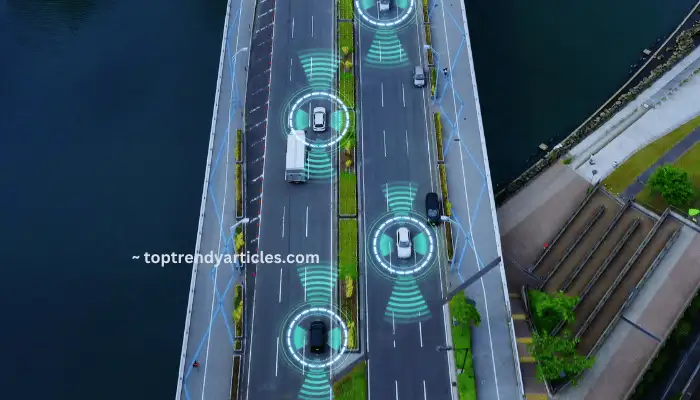The automotive industry is undergoing a fascinating transformation, with AI bringing about improved capabilities to help make vehicles safer and more efficient. The integration of continuous AI updates into vehicles heralds a new age in driving as this technology improves. Driving to safety features in vehicles, AI is everywhere and changing everything about cars. Here we highlight the main usage meets of AI in automobiles are and how it will change driving future?
- Self-Driving Cars: The Future of Transport Autonomous Driving — Easily the most conspicuous use of AI in automation for the automotive sector. Tesla and Waymo are companies that use large amounts of AI to drive cars in their Self-Driving Cars without human intervention as a major feature. The AI allows these vehicles to interpret data from sensors (like cameras, radar or LIDAR) like a driver might navigate roadways and identify obstacles while performing complex driving tasks.
AI algorithms analyze this sensor data to identify objects – such as recognizing road signs, and predict the behavior of other pedestrians and cars on a self-driven vehicle. This enables the vehicle to take responsible driving actions, for example stop at red light, avoid collision and change lane. The more human drivers can be replaced with autonomous systems, the lower roads will impact accidents and traffic.
- Advanced Driver Assistance Systems (ADAS): The Revolution in Vehicular Safety Though truly autonomous vehicles are still being worked on and developed, AI-driven Advanced Driver Assistance Systems (ADAS) can be found in a lot of cars today. ADAS relies on artificial intelligence to improve driver and passenger safety, help with driving-related tasks and limit the probability of a car or truck crash.

Principal ADAS functionalities driven by AI:
Adaptive Cruise Control: The need to manually adjust the speed of your car according to the one right ahead is eliminated by this feature which allows automatic changes in speed. Lane-Keeping Assist — Helps detect lane markings with the help of AI and assist back to its own lane; left that gliding form, if it detects a drift. Automatic emergency braking: If a potential crash is detected, the car brakes to avoid or minimize damage. Parking Assistance: Provides automatic parking of a vehicle, analyzing the surrounding environment and then guiding it into space. These AI-based characteristics not only serve to enhance safety, but also reduce workloads associated with specific challenges during the latter’s operation.
- Smarter, Connected Cars: Vehicle-to-Vehicle Communication AI is also changing the way vehicles communicate to other road users and surrounding infrastructure by using Vehicle-to-Vehicle (V2V) or Vehicle-to-Everything(V2X) communication. AI expert Venkata Naga Sai Kiran Challa says that AI helps vehicles to communicate in real-time which is able of exchanging important data like position, speed and road though mentioned.
This real-time data sharing allows for better coordination and decision-making on the road, ultimately decreasing accident potential and improving overall traffic efficiency. If one car detects an obstruction or dangerous condition, it can immediately inform other vehicles in the vicinity so that they slow down and switch lanes if necessary.
- The Soul of Self-Driven Tech — AI in Robot Cars Artificial intelligence (AI) as we know it today enables self-driving cars to gather live data from the road and respond, making them autonomous. These vehicles operate similarly, with AI systems taking in data from cameras, LIDAR (light detection and ranging), radar and GPS to build a precise 3D map of the car’s environment. This map is then applied to drive roads, evade hindrances and taking dynamic on driving.
AI in self-driving cars helps them estimate the intention of other road users like pedestrians, cyclists or any vehicle to deal with different types of driving scenes. For example, if there is a person who will soon cross the street then AI can predict it and slow down or completely stop the vehicle in order to avoid an accident.
Of course, the world of transportation is expected to be completely revolutionized by self-driving cars that make use of AI and this technology too has been advancing at a break-neck pace.
- Making your drive of life better: Safer and Efficient Ride Automotive AI is changing the game of safety and functionality, but it also improving the overall driving experience. AI and motor vehicles used in conjunction also allow manufacturers to incorporate a number of comfort, convenience or efficiency-enhancing features known as connected services.
In addition, AI can also improve fuel efficiency by learning driving patterns and adjusting engine performance in real-time. These AI-driven navigation systems can deliver live traffic updates and suggest you alternative routes to avoid congested roads, or even predict the future using ancient data.
AI also makes the driving experience more enjoyable: when a driver gets into an AI-controlled vehicle, it immediately starts adjusting dozens of parameters (some dimensions transferred to conversation) such as seat position, interior temperature and entertainment options — all based on how that particular driver likes things. Tenon says voice-activated controls powered by AI have new driver interaction with the infotainment system that otherwise would require hands-on attention.
Future of AI in Cars: Conclusion And as this AI technology improves, its use within the automotive industry will do so also — making our vehicles smarter such that they become not only safer but ever more connected. AI is revolutionizing auto, from self-driving cars to improved vehicle communication. We still have many hurdles to overcome, including safety concerns and issues of trust the reliability on these AIs but there are so much potential for us here.
Artificial intelligence offers the potential to transform transportation, leading to safer roads and fewer traffic jams by taking pressure off drivers. While the future of AI in cars holds great promise given that car manufacturers are constantly innovating.



